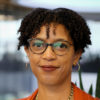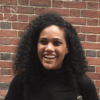On April 14, at a special session of DH Open Office Hours, two recipients of NULab Seedling Grants shared their grant-funded work. The panelists were Nicole N. Aljoe, Associate Professor of English and Africana Studies and Director of the Africana Studies Program at Northeastern University, and Myojung Chung, Assistant Professor of Journalism and Media Advocacy at Northeastern University. This event was the second of two grant recipient panels that the NULab and the Digital Scholarship Group (DSG) have jointly hosted during the Spring 2021 semester.
Nicole N. Aljoe began the panel by presenting the Early Black Boston Digital Almanac (EBBDA), whose website will go live in late spring or early summer. Aljoe initiated the project in 2016 for classes on representations of Boston and Early African American Literature, with the goal of sharing information about early Black Boston. The project’s title references Benjamin Franklin’s Poor Richard’s Almanack, a popular American publication in the mid-eighteenth century. Over the past five years, Aljoe and Northeastern faculty and students have created a robust selection of exhibits and maps for the EBBDA, which are showcased on the website. In the future, the website will also include a new section on texts. Aljoe explained that recent NULab seedling grant funding has helped her hire a team of undergraduate and graduate research assistants, who have prepared the site for publication and strengthened its pedagogical function. Research assistant Tanvi Modi briefly spoke to present the site’s logo and introduction page. Aljoe then shared that Nicole Sojkowski and Alanna Prince created educational materials to accompany the site’s content, a task that Savita Maharaj will continue this summer. Aljoe also credited Amanda Rust and Alicia Svenson of the DSG for their help with the CERES Exhibit Toolkit and the NULab’s Digital Integration Teaching Initiative (DITI) for teaching student contributors how to use work with digital exhibits and editions. The EBBDA site is now being finalized and will soon celebrate the launch of the public site.

Myojung Chung then presented her project, “When I Learn the News is False: How Fact-Checking Info Stems Spread of Fake News.” Chung contextualized the project’s significance in the danger that fake news on social media poses to democracies. One of the most insidious aspects of fake news, she argued, is that people are overconfident in their ability to successfully detect fake news. Chung believes that this discrepancy is due to a phenomenon called Third-Person Perception, in which people presume that other people are more strongly influenced by the media than they are. Applying this theory to the study of fake news, Chung’s project hypothesized that fact-checking messages on social media would decrease the likelihood that people share fake news posts by appealing to people’s belief that they will not be fooled by fake news. To test this hypothesis, Chung created a series of fake news posts on social media platforms, changing the number of likes and whether there was a fact-checking message attached. She found that fact-checking did in fact decrease the popularity of these posts. Chung clarified that although fact-checking can combat fake news through Third-Person Perception, it cannot change other psychological phenomena that contribute to the popularity of fake news, such as the bandwagon effect, where people agree with a popular social media post because it is popular. Yet, since fact-checking messages are a powerful tool, the next steps are to find ways to spread them more widely, since fake news usually travels further than fact-checking does.
A question-and-answer session followed the presentations. Nicole Aljoe explained the EBBDA’s process for collaborating with student contributors, which has been established through past partnerships with classes. The EBBDA website offers both templates for student contributors and guidance on best practices, pulling from the Early Caribbean Digital Archive’s pedagogical resources. Aljoe also described the complications posed by having so many student contributors. Since student contributors have a lot of leeway in the topics they choose to write about, their work has taken the website content in unexpected thematic and chronological directions. Although managing all these contributions has posed difficulties for EBBDA staff, Aljoe maintains that having the website shaped by its own student audience is well worth the effort. “We welcome any and all contributors,” she said. Aljoe also described her goal of having the EBBDA function as an alternative to in-person field trips for Boston Public Schools, which are logistically very difficult for teachers to arrange. Panel attendees congratulated Aljoe and the research team on the project and complimented the website’s accessible layout.
Myojung Chung also answered several questions about her project. In response to a question about how fact-checking tends to be aligned with left and liberal politics, Chung acknowledged that political orientation is a complex variable outside the scope of this project. Since people tend to only believe fact-checking messages that align with their political beliefs, Chung crafted apolitical posts for this experiment. She also elaborated that people also tend to believe fact-checking messages more when they come from AI, which is perceived as apolitical, as opposed to from a specific entity. In response to a question about the backfire effect, where people double down on their belief in fake news when it is corrected, Chung explained that the backfire effect refers more to people’s belief in the news than to the action of sharing content. She also drew a distinction between the terms “misinformation” and “fake news.” As a journalist, Chung prefers the term “misinformation,” since fake posts should not be considered news at all. Yet the term “fake news” is the more accessible term because it is more present in popular discussion of the topic.
In all, attendees at the event enjoyed the opportunity to learn about the excellent research projects that the NULab helps to fund. NULab seedling and travel grants are open to Northeastern University faculty and graduate students. During the COVID-19 pandemic, travel grants can be used to cover expenses related to online events. More information about NULab grants can be found on the “Seedling and Travel Grants” page.






